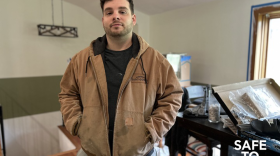Firefighters are asking the federal government for more attention on how their exposures to PFAS chemicals may be harming their health.
Diane Cotter of Rindge has been trying to shed light on how the industrial chemicals may be sickening firefighters since her husband – then a firefighter in Worcester, Mass. – was diagnosed with prostate cancer in 2014.
He had to retire from the force, but is now cancer-free.
Cotter says they suspect firefighters like her husband have spent decades exposed to dangerously high levels of PFAS – through flame-retardant foams, and coatings on their protective gear.
Analysis by a researcher at the University of Notre Dame, provided to Cotter, shows elevated levels of various PFAS chemicals throughout a 2004 set of turnout gear.
The older forms of those chemicals have since been phased out of most American manufacturing. But they remain persisent in the environment and human bodies.
Studies suggest exposure to even low levels can put people at risk of kidney and liver disease, testicular cancer, reproductive problems and other diseases.
Cotter says that as firefighters’ gear heats up, it allows toxins to seep through into their bodies – including into reproductive systems and other sensitive organs.
Studies show firefighters have an elevated risk of developing certain cancers in those areas.
"Our political bodies do see us, but I think that they think that we're cared for and we're not,” Cotter says. “So we truly need this study now.”
New Hampshire Senator Jeanne Shaheen recently led a bipartisan call for the Centers for Disease Control to include firefighters in planned PFAS health studies. Activists like Cotter are now calling on Massachusetts Rep. Jim McGovern to lead a similar charge in the House.
The CDC will soon begin a first-of-its-kind national health study on the effects of PFAS, focusing in part on water contamination at Pease International Tradeport in Portsmouth.
Cotter says she hopes firefighters will be included, so they don’t have to wait longer for answers and aid.








